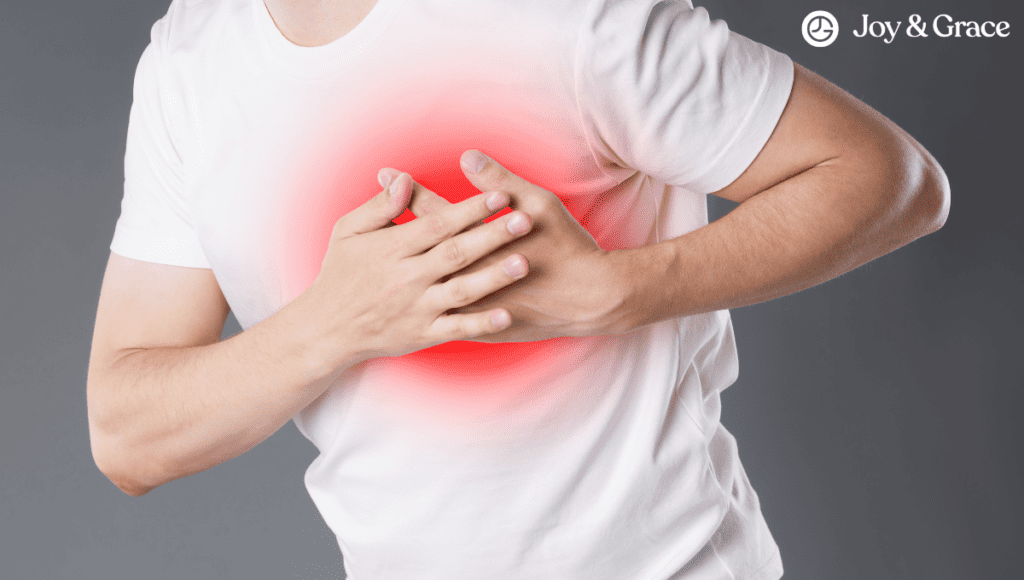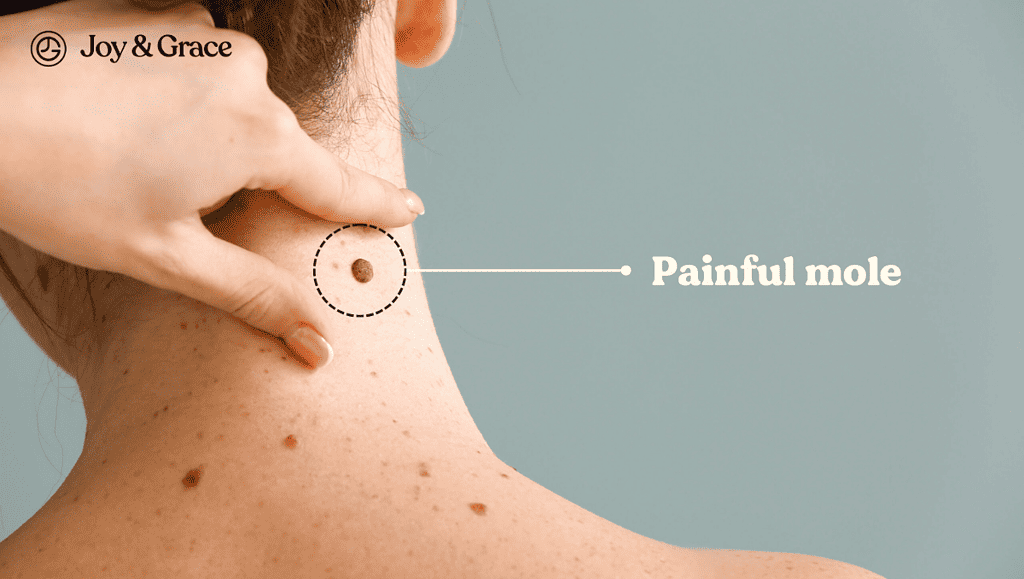Maybe you've been dealing with some ongoing shoulder pain lately. We know how frustrating that recurring ache can be. You start wondering, - is it just a pulled muscle or something more serious I should get checked out?
The truth is that shoulder pain can stem from many causes - injuries, arthritis, heart problems, etc. Getting to the root of what's causing yours is so important, both for peace of mind and finding the treatment that will really help.
We want you to have the information you need to get to the bottom of this. Below, we'll cover the common causes of shoulder pain and the typical symptoms of each. That way, you can better understand what might be behind your discomfort. There are also details on treatment options for the various issues.
Armed with this knowledge, you can take the right steps to stop the nagging ache and get back to pain-free movement. Let's dive in.
Is Right Shoulder Pain A Sign Of A Heart Attack?
Usually, shoulder pain without any other symptoms—primarily chest pain—is not a sign of a heart attack. That goes for both the right and left shoulders.
When there’s a heart attack, shoulder pain typically goes along with:
- Chest discomfort
- Shortness of breath
- A rapid or irregular heartbeat
- Dizziness
- Nausea, etc.
An exception to this rule are people with neuropathies (conditions that cause nerve damage). Neuropathies typically occur in the elderly and in diabetics.
The damaged nerves in this group of people make them unable to feel the typical heart attack signs. As a result, seniors and diabetics may experience only shoulder pain and no other symptoms during a heart attack.
Regarding which shoulder the pain usually radiates to, the left shoulder is more commonly involved.
That does not mean that the right shoulder is spared, though.
For example, in a study of 266 people who had recently had a heart attack, 28.9% said that their chest pain also spread to their right shoulder.
For women in the study, this number was even higher. Among 76 women, 39.5% reported right shoulder involvement.
Still, radiation to the left shoulder was more commonly reported. 50.8% of patients reported left shoulder radiation.
Can Heart Attack-Related Shoulder Pain Come And Go?
No, heart attack-related shoulder pain does not come and go. It is a constant and usually severe pain radiating from the chest.
On the other hand, shoulder pain that comes and goes, especially with exertion, is more likely to be caused by angina.
Angina causes chest and shoulder pain that comes and goes, often when exerting yourself or during other triggers, and gets better with rest or medication. This is different from a heart attack. With angina, the heart muscle briefly does not get enough blood flow and oxygen. The pain goes away once the heart gets adequate blood again (while resting).
But with a heart attack, the shoulder and chest pain do not get better with rest. A heart attack means part of the heart muscle is dying due to blocked blood flow. This causes severe, constant pain that lasts a long time, even at rest, unlike angina pain that comes and goes.
The bottom line is - any new chest and shoulder discomfort, especially if it occurs when exerting yourself and is relieved with rest, should be checked by a doctor as soon as possible.
Can Pain In Both Shoulders Be Heart Attack-Related?
Pain in both shoulders without chest discomfort or other symptoms is usually not a sign of a heart attack.
If there are other symptoms present (typically moderate to severe chest discomfort), then yes, heart attacks can cause radiating pain in both shoulders.
In fact, studies have suggested that pain radiating to both shoulders is a strong symptom of acute myocardial infarction (heart attack). This is especially true for women.
One study found that pain radiation from the chest to both arms or shoulders had a sensitivity of 38.2% and a specificity of 90.6% for acute myocardial infarction (a heart attack).
These findings show that bilateral shoulder pain is a relatively rare finding (low sensitivity). But when it occurs, it is a concrete sign of acute myocardial infarction (high specificity). Experiencing these symptoms should prompt emergency medical attention.
To use some simple examples:
The heart muscle isn't getting enough blood flow during a heart attack. That can cause some severe distress. Now, the nerves responsible for carrying those pesky pain signals have a mixed-up GPS system. They can't quite pinpoint the exact location of the pain. So they decide to spread their wings, or in this case, their pain signals, to different areas of the body.
It's like the heart is saying, "Hey, I'm not the only one suffering here! Let's share the love (or, should I say, the pain). So, as a result, the pain can travel not only to the chest but also to both shoulders.
Now, it's important to remember that everyone's experience with a heart attack can be a little different. Some people might feel pain only in the left shoulder. Others might feel it in both areas or even in different areas altogether. Our bodies are unique, after all!
Let's continue dissecting the nature of this pain:
What Part Of Your Shoulder Hurts With Heart Problems?
With heart problems, shoulder pain is often described as a diffuse tightness that seems to originate from the chest.
This tightness usually affects the entire left shoulder area and also travels down the left arm.
Unlike typical musculoskeletal shoulder pain, which is more localized, heart-related shoulder pain is a broader tightness radiating from the chest to the shoulder and arm.
As we mentioned before, this occurs because the heart pain signals travel along the shared nerve network.
Does Shoulder Pain Always Mean A Heart Attack?
No, shoulder pain doesn't always indicate a heart attack (in fact, sole shoulder pain very rarely means a heart attack). It can have various causes, some related to the heart while others are not. There are other common reasons for shoulder pain that you should first consider.
Some of these common causes include:
1. Rotator cuff tendonitis or tendinopathy: This is inflammation or irritation of the rotator cuff tendons. It’s most commonly caused by overuse, repetitive physical activities, or aging.
2. Rotator cuff tears: These are partial or complete tears in the tendons of the rotator cuff. Trauma or typical wear and tear are common causes of them.
3. Shoulder impingement syndrome: This is compression or pinching of the tendons and bursa in the shoulder joint. It is often caused by repetitive overhead activities or poor posture.
4. Adhesive capsulitis (Frozen shoulder): Frozen shoulder is a condition characterized by stiffness and limited range of motion in the shoulder joint. It is often associated with inflammation and thickening of the joint tissue.
5. Shoulder osteoarthritis: This happens when the cartilage in the shoulder joint breaks down over time. It can lead to shoulder pain, stiffness, and a reduced ability to move the shoulder.
6. Bursitis: Bursitis means inflammation of the bursa. Bursas are fluid-filled sacs around joints. They are a type of connective tissue that cushion the bones, tendons, and muscles around the shoulder joint.
7. Shoulder instability: Shoulder instability occurs when the shoulder joint partially (shoulder subluxation) or fully slips out of place (shoulder dislocation). It often happens due to loose ligaments or an injury.
8. Shoulder fractures: Shoulder fractures are breaks in the bones of the shoulder, such as the clavicle (collarbone) or humerus (upper arm bone).
9. Tendon tears or ruptures: Tears or ruptures in the shoulder tendons, such as the biceps tendon.
10. Septic Arthritis (Shoulder joint infection): This is when the shoulder joint gets infected. It can cause pain, swelling, and limited range of motion.
What Type Of Shoulder Pain Is Heart-Related?
It all depends on what's causing it and its seriousness. When a heart attack is the reason behind the pain, for instance, it usually starts as a tightness in the chest that spreads to the left shoulder, arm, neck, or jaw.
The word “spreads” is very important here: Having shoulder pain alone is very (if not extremely) unlikely to be due to heart disease. The main way heart problems cause shoulder pain is by spreading the pain from the chest up toward the shoulders.
Let’s review what type of pain some of the most common heart-related conditions usually cause.
Angina Pectoris
We mentioned Angina a bit earlier, too.
This is the most common culprit behind heart-related shoulder pain. It's when your heart doesn't get enough oxygen-rich blood and starts acting up. Physical exertion, emotional stress, cold weather, or eating a big meal are some of its triggers.
The chest discomfort can feel like:
- Pressure,
- Squeezing,
- Tightness,
- Heaviness, or
- Fullness.
Because the pain spreads from the chest, the shoulder pain also feels similar.
But wait, aren’t those also symptoms of a heart attack?
Well, thankfully, angina usually only sticks around for a few minutes and disappears once the trigger is gone. There’s no permanent damage to the heart. That’s not the case with a heart attack.
If not properly controlled and treated, however, angina increases the risk of a heart attack occurring.
Let’s see what kind of shoulder pain a heart attack causes now.
Heart Attack
Shoulder pain that is associated with a heart attack can have the following characteristics:
- It is usually accompanied by other symptoms such as chest discomfort (typically the main symptom), shortness of breath, sweating, nausea, dizziness, or anxiety.
- The left shoulder is usually affected. However, the right shoulder can also be involved, and sometimes the pain can spread to both shoulders.
- It may be a diffuse pain that spreads to the back, neck, jaw, or arm rather than a sharp or localized pain (such as shoulder pain only). Pressure or movement do not affect the pain.
- It may be a gradual pain that increases over a few minutes rather than a sudden or stabbing pain that lasts for a very short time.
- It may occur during physical exertion, emotional stress, or even when you are resting.
This is another key difference between angina and a heart attack. Anginal pain is triggered by physical exertion and relieved by rest. The pain due to a heart attack can occur at any time, and rest does not relieve it.
Now, if you want to prevent heart problems or lower your risk of getting them, there are some things you can do to live a healthy lifestyle. Here are a few tips:
- Quit smoking or avoid exposure to secondhand smoke.
- Maintain a healthy weight and eat a balanced diet low in saturated fat, cholesterol, salt, and added sugars.
- Exercise regularly and stay physically active.
- Manage your stress levels and practice relaxation techniques.
- Control your blood pressure and cholesterol levels.
- Take your medications as prescribed by your doctor.
Pericarditis
In addition to angina and heart attacks, there are other things that can mess with your heart and give you shoulder pain, too. Take pericarditis, for example.
It's when the sac surrounding your heart gets inflamed. That can cause a sharp or stabbing pain in your chest that might spread to your shoulder or back. The pain might worsen when you lie down, take deep breaths, or cough.
Pericarditis can happen due to infections, autoimmune diseases, or chest injuries.
How Can I Test Myself For A Heart Attack?
Unfortunately, there's no way to fully test yourself for a heart attack at home. The only way to be sure is to get checked out by a doctor. Going in is the best thing you can do for peace of mind.
Some common signs of a heart attack to watch for include:
- Chest pressure or tightness that lasts more than a few minutes
- Severe stomach, shoulder, arm, neck, or jaw pain
- A rapid or irregular heart rate
- Shortness of breath
- Lightheadedness, nausea, or cold sweats
Symptoms that are usually not a sign of a heart attack include brief, stabbing chest pains and shoulder or arm soreness or discomfort that comes and goes.
Things are not always straightforward, though, and there are always exceptions to some rules.
For instance, panic attacks can mimic heart attack symptoms like chest pain and shortness of breath. But panic attacks pass without causing harm.
On the other hand, people with diabetes or neuropathy can have mild or atypical heart attack symptoms, as we mentioned earlier. Their pain may be less severe.
The bottom line is that if you have unexplained symptoms concerning enough that you searched “heart attack test,” get medical care. Describe all your symptoms clearly to the doctor. This will give you the definitive answer you need about your heart's health. Calling emergency services is best if you have severe or persistent symptoms.
What should I Expect During My Office Visit?
A physical exam, different tests, and treatment are all performed at the doctor's office. A heart attack is an emergency and is managed according to the protocols in the health center.
These are some tests that can help diagnose a heart attack:
- Electrocardiography: The ECG is the most critical tool to check and sort out people who may have a heart problem, such as a heart attack. It shows the electrical activity of the heart. It can confirm the diagnosis in about 80% of cases.
- Heart markers or enzymes: These are substances that are released into the blood when the heart muscle is damaged. The guidelines from experts recommend that these markers be measured as soon as possible in people who may have a heart attack. The best marker is troponin because it is very sensitive and accurate. Troponin is a protein that helps the heart muscle contract. It is usually not found in the blood, but only when the heart muscle dies.
- Heart imaging: For people with a high chance or confirmed diagnosis of a heart attack, coronary angiography can be done. It is used to see if there is any blockage or narrowing in the blood vessels (called coronary arteries) that supply the heart.
- Complete blood cell count: This measures the number and types of cells in the blood.
- Comprehensive metabolic panel: This measures the levels of different chemicals and substances in the blood.
- Lipid profile: This measures the levels of fat and cholesterol in the blood.
Treatment
In simple terms, prehospital care for people with chest pain who are having a heart attack involves the following:
- Getting access to your veins and providing oxygen if the oxygen levels are low.
- Giving you chewable aspirin right away.
- Using nitroglycerin under the tongue or as a spray for immediate relief of chest pain.
- Using telemetry (continous vital sign measurement) and performing an ECG if available.
In the emergency department:
- People suspected of having a heart attack should receive sublingual nitroglycerin.
- The American Heart Association recommends medications called beta blockers. It is for all patients with a certain type of heart attack called STEMI.
- If someone with a heart attack is less than 90 minutes away from a hospital, there's a way to fix it through surgery. This should be a hospital that can perform the procedure called primary Percutaneous Coronary Intervention (PCI)
- If the hospital is far away, like more than 2 hours away, doctors might use an emergency treatment called fibrinolysis. It's basically a medication that helps dissolve the clot causing the heart attack. This can buy some time until the patient can get to a PCI-capable facility for further treatment.
- So, the key here is that time is of the essence when it comes to treating a heart attack. If the patient is close to a PCI-capable hospital, they should go right away. But if they're far away, fibrinolysis could be an option to help them before they can reach the right facility.
Bonus Info - The Reason Behind Shoulder Pain During A Heart Attack
A heart attack, or myocardial infarction, is a serious medical condition that occurs when the blood flow to the heart muscle is reduced or blocked. This causes damage to or death of the heart tissue. Ouch! And guess what? One of the most common symptoms of a heart attack is chest pain or discomfort.
So you are probably wondering, how does a heart attack cause shoulder pain? Let's dive into the mechanism behind this intriguing phenomenon.
You see, it all comes down to something called referred pain.
Picture this:
The nerves responsible for carrying pain signals from both the heart and the shoulder share the same pathways in the spinal cord and the brain. It's like they're traveling buddies on the pain highway.
Now, here's where it gets interesting: When the heart muscle suffers damage due to a lack of blood supply, the brain gets a bit confused. It can't quite pinpoint the exact source of the pain. So it decides to spread the love, or in this case, the pain. Now, let's dissect the different components of this system:
- Sensory Nerves:
Nociceptors (pain receptors) are stimulated within the heart due to ischemia. Ischemia means reduced blood supply to body tissues (in this case, the heart). These nociceptors generate signals for sensory nerves (nerves that detect feelings/sensations) originating from the heart. - Spinal Cord Segments
The sensory nerves carrying the pain signals from the heart then enter the spinal cord. They do this through the spinal nerve roots at specific segments. In myocardial infarction, the signals are transmitted through the following spinal cord segments:
- T1-T4: These segments correspond to the spinal nerves arising from the upper thoracic (chest) region of the spinal cord. The sensory nerves from the heart converge at these segments.
- T1-T4: These segments correspond to the spinal nerves arising from the upper thoracic (chest) region of the spinal cord. The sensory nerves from the heart converge at these segments.
- Nerve Pathways
The sensory nerves from the heart converge with other sensory nerves. These nerves come from the chest wall, left arm, and other nearby structures. All these share common nerve pathways. Some of the important nerves involved include:
- Vagus Nerve (Cranial Nerve X):
The vagus nerve carries sensory fibers from the heart. It plays a role in transmitting pain signals from the heart during a myocardial infarction. - Spinal Nerves:
Specific spinal nerves carry the sensory nerves from the chest, the shoulder, and the arm. These include the intercostal nerves (T1-T11), which power the muscles and enable feeling for the skin of the chest. The brachial plexus nerves (C5-T1) power the upper limb muscles and skin. In the spinal cord, these nerves also connect with the sensory fibers from the heart. This is the connection between these body parts.
- Vagus Nerve (Cranial Nerve X):
- Central Nervous System:
The mixed pain signals from the heart and the surrounding structures are transmitted to the brain. In the brain, they are processed and interpreted. The brain may misinterpret the signals. It may perceive the pain as originating from the shoulder rather than the heart.
So much for anatomy! But isn't it fascinating how our nervous system can sometimes play tricks on us? So, share the knowledge the next time someone wonders how a heart attack causes shoulder pain. Impress them with your knowledge of referred pain and the shared pathways. Stay with me. Let's characterize this pain further:
Takeaway
As we wrap up, here are a couple of key takeaways we want you to remember:
1. Shoulder pain can be a surprising sidekick:
When it comes to heart attacks, shoulder pain might not be the headliner. But it definitely deserves a spot on the stage. The nerves that carry pain signals from the heart also intertwine with those connected to the shoulder. So, if you experience shoulder pain along with other heart attack symptoms like chest discomfort or shortness of breath, don't brush it off. Pay attention and seek medical attention.
2. Referred pain is a creative storyteller:
Our bodies have a way of playing tricks on us. Referred pain is a prime example! During a heart attack, the heart muscle's distress signals can take a detour and manifest as pain in unexpected places. These places include the shoulder.
3. Trust your instincts and be proactive:
Your body is a clever communicator. If you ever experience unusual or persistent pain, especially with other heart attack symptoms, don't hesitate to trust your gut and seek medical advice. Early detection and intervention can be life-saving, so don't brush off any potential heart-attack warning signs.
Now you are armed with this knowledge. You're better prepared to recognize the unique connection between heart attacks and shoulder pain. Remember, your health is precious, and caring for your heart is vital to self-care. Stay informed, stay vigilant, and keep your shoulders (and heart) pain-free!















